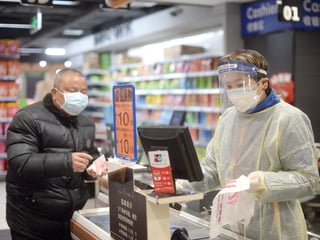Coronavirus: Why UK should be glad to still benefit from EU networks – Christine Jardine


I have always been one of those strange people who just relishes being in an airport. It is the buzz. The excitement. Everyone there is either on their way to an adventure or arriving home to a reunion with loved ones straight from a Richard Curtis movie.
But this week that changed and being in an international airport became a very different prospect, with a potential far removed from excitement.
Advertisement
Hide AdAdvertisement
Hide AdThe catalyst for my change of heart was a simple bottle of hand sanitiser, one of many making their first appearance in departures and distributed liberally throughout the passenger lounge.
As I stopped to use one by a rack of newspapers, the giant TV screen ahead of me was announcing the confirmation of three more cases of coronavirus in the UK.
For the first time, the emerging pandemic seemed a very real prospect. The airport ceased to be a place of excitement and became a junction strewn with potential health hazards.
A glance at the board told me the flight immediately after mine was heading for Milan. Some foreign tourists, wearing sensible face masks, were browsing in duty free. I detected a language I couldn’t quite make out from the couple behind me as I ate. All of us potentially a risk to each other.
I do not think I have been in touch with coronavirus, but I cannot know for sure. For me, as for most people, it is probably not a critical danger. At least I hope not.
But I cannot be so sure that my sister with asthma, best friend with diabetes, or elderly relative with a supressed immune system as a result of cancer treatment, would be as confident.
Until that point I had seen the growth of the media coverage around the outbreak through the prism of an elected representative keeping informed about a public issue.
An issue which, for most of my constituents at least, seemed a distant one. The effects, although dreadful, seemed mostly to be abroad. All of that has now changed.
Shaking hands not recommended
Advertisement
Hide AdAdvertisement
Hide AdPerhaps it was inevitable in the modern interconnected world that no country would be immune. In a few weeks, we have seen the outbreak change from one mainly centred in Asia to a global phenomenon. And one, it appears, increasingly difficult to counter.
The simplest of things, like shaking hands, is now not recommended. Work surfaces, bannisters and door handles everywhere are all potential recepticles of germs.
Clichés like being surrounded by a silent killer suddenly don’t seem to over dramatic. But if we are to beat this potential pandemic there are two things I believe we must do.
One is to keep calm and not look for scapegoats. Let’s remember that everyone from our GPs, to holiday companies, airlines and government bodies is doing their best against an unknown quantity.
And the second is to remember that the key to tackling conoravirus will be working together with our friends, both internationally and personally.
Let’s not forget the benefits that being part of a union of nations can bring when tackling a crisis like this.
Right now, the EU is working round the clock on a cross-continental strategy to support efforts to tackle the virus, including coordination with member states to share information, assess needs and ensure an EU-wide response.
The European Commission is also funding research, offering millions of euros in support through the EU civil protection mechanism, and supporting China with emergency medical supplies to tackle to outbreak at its source.
Advertisement
Hide AdAdvertisement
Hide AdThe EU has an early warning and response system, and a dedicated Health Security Committee and communications network.
Knowing that the UK is still able to participate and benefit from these networks and structures throughout the transition period brings me a certain level of comfort.
But what about next year? Some scientists are predicting that the virus will ebb away as we enter the warmer months of the year, but that it may return with a vengeance by next winter.
Worrying reports of racist abuse
I didn’t want to make this column about Europe, but this just goes to show that our ability to tackle a health crisis like coronavirus in today’s globalised world can only be weakened by Brexit.
So let’s make sure that, whatever happens, we stay as much part of that network of nations, and others, as possible.
And on a personal level that co-operation becomes even more important. If there is someone you know who may be vulnerable, keep an eye on them.
Be careful to follow all the advice and try not to take offence at someone who may be being what you consider as over-cautious, for a reason. They may have one of those underlying health conditions which makes a bug that is harmful to most of us, dangerous for them.
One of the things that has worried me most is the reports of people being subjected to racial abuse because they or their family may be from or have visited one of the countries which has been affected early by the virus. That is unacceptable.
Advertisement
Hide AdAdvertisement
Hide AdIt may be that over the next few months we all have to modify how we live. Face masks may become commonplace and international flights rare. Our economy could take a hit.
But in recent years we have coped with Icelandic ash clouds grounding all flights, with swine flu, foot-and-mouth disease and Sars.
If we listen to the advice and work together to minimise the risks, we will cope with this too.
Christine Jardine is the Scottish Liberal Democrat MP for Edinburgh West
